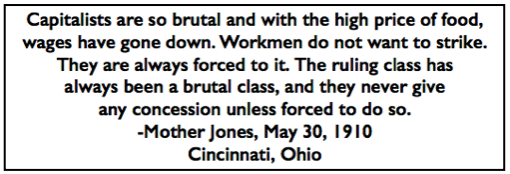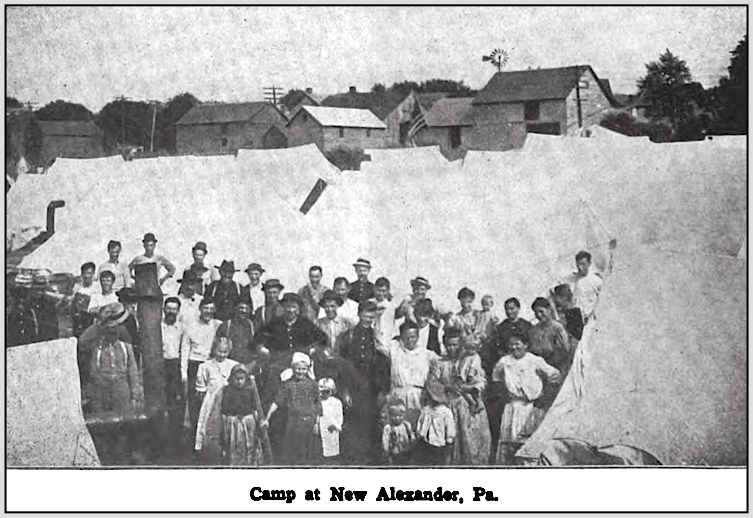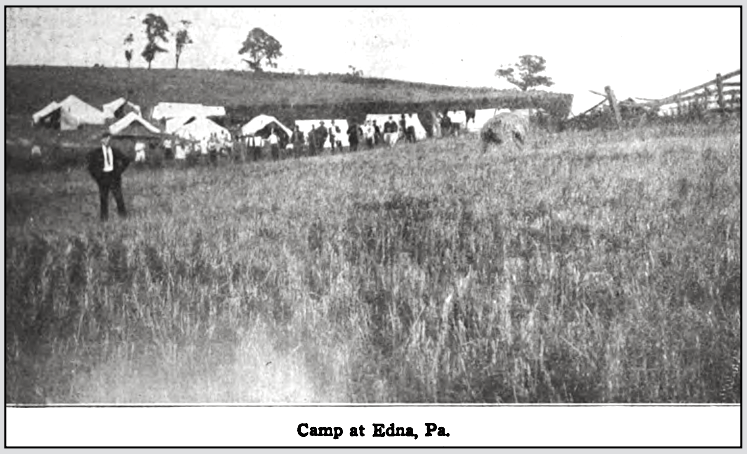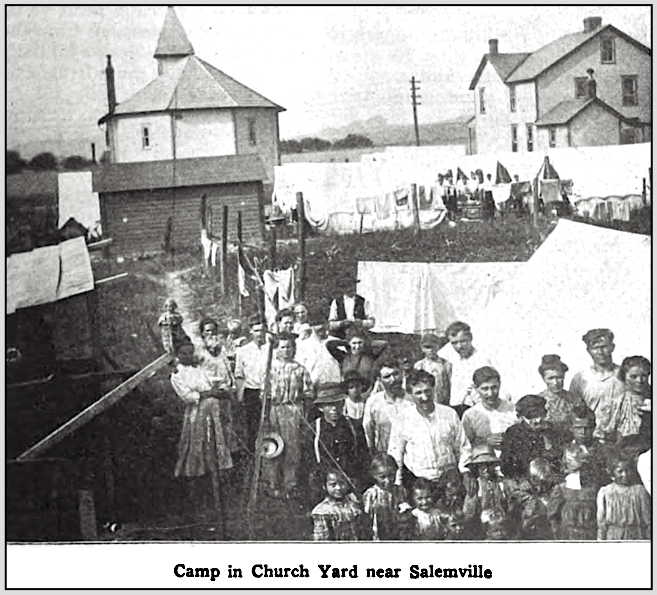 ———-
———-
Hellraisers Journal – Friday September 23, 1910
Westmoreland County, Pennsylvania – Cossacks Terrorize Irwin Coalfield Strike
From the International Socialist Review of September 1910:
Cossacks vs. “Black Hundreds.”
Brutal as the state constabulary have shown themselves on numerous occasions the testimony on all sides is overwhelming that compared with the thugs and bums engaged as deputies by the coal companies the State Police are gentlemen.
One of the odd developments is the cordial dislike of the State Police for the deputies. The State Police are not backward about declaring that practically all of the rioting and killing has been caused by the deputies. You must understand that economic interests are at the bottom of this feeling of these two forces for each other. The rank and file of the Police get $60.00 a month and board, no matter what is doing. When all is quiet they get their pay for patroling some country road on a well groomed saddle horse. If there must be a strike they would much rather see a nice quiet orderly one where there are no riots.
But the deputies are in a different boat. If all were quiet they would have no occupation. So to make their jobs secure they must keep something doing all the time. They explode a charge of dynamite under the corner of an unoccupied house, fire a lot of shots some night or when they meet an unarmed striker on the highway slug him or arrest him. When there is any real duty to perform, when there is a batch of strike breakers expected who must be prevented from talking to the strikers the first thing they do is fill up with whiskey. At one hotel where a bunch of them stopped, six drinks of whiskey in their stomachs and a half pint in their pockets was the regular ration, before going out on any special duty.
Who They Are.
Not only every race but every combination and every cross of every race that ever came from Europe is represented from the Arctic Ocean to the Persian Gulf and from the Caspian Sea to the Bay of Biscay. Around Bradenville and Latrobe there are a great many Italians, the staunchest and most resolute group engaged in the battle. At Claridge and Export there are large numbers of Poles. John Potlar of Claridge who was brutally murdered by one of the “Black 100’s” was a Polish Catholic. Around Greensburg, where the strike started, there are many Americans and Americanized Germans. At Madison on the Hempfield branch, I saw more Scotch and Irish miners than I have seen since I worked in the mines on the Pan Handle 27 years ago. The Arena mine, where these men work, has not turned a wheel since the first day of the strike. A car has stood half loaded since the last day they worked. Not even one man has deserted at Madison.
Alert and Suspicious.
In the early days of the strike the Socialists at Greensburg engaged a big hall and advertised a meeting of striking miners for Sunday and had John Slayton make an address. The bills did not say anything about who was calling the meeting and as soon as the strikers, especially the foreigners, arrived they wanted to know, “Who calla that meet?” They admitted after the meeting that they suspected that it was the bosses had called it to make some move to disrupt the strike. They were delighted when they found it was a working class political party wishing to give them instruction and encouragement.
It is really dangerous for a stranger to enter the mining camps alone without something to show, some pass or some credential. I was rash enough to venture out along the New Alexander branch visiting the camps at New Alexander and Salemville. An organizer or some officer of a local went with me or I knew some one at all the camps I visited excepting those at New Alexander. The “Black Hundreds” and the state police eyed me suspiciously.
When I got to one camp, I stopped in the road opposite where a group were standing inside the fence, but there were only scowls for me. I walked over and made as if to enter when one of them asked in a low, menacing tone, “What you want?” The instant I saw the first scowl I knew I was under suspicion. I did not in the least resent it. In fact I was rather pleased to find that these latest recruits (they were the last to join the strike) were so alert that they suspected anyone that even spoke to those whom they looked upon as enemies of their class. The fellow that acted as spokesman while I was squaring myself and proving that I was not a spy nor a scab is holding the paper in the photograph. The paper is the charter of the newly organized local. This experience taught me not to visit camps without a conductor. Both the strikers and the guards are suspicious of strangers.
The Injunction.
The injunction is sweeping. It forbids marching in bodies anywhere in Westmoreland County. It forbids the strikers from coming anywhere near the mines, and is such a thoroughly workmanlike job that when the strikers wanted to attend a funeral they had to get a permit from the judge and then the deputies violated the terms of the permit and Tom Jamison compelled the man that carried the American flag to lower it passing Jamison No. 2.
This No. 2 manned by the same kind of foreigners thousands of whom are on strike, is one of the mines that the strikers have not been able to close or even cripple. It is a coke plant and many of the workers work outside. Jamison felt that it would have bad moral effect on his submissive slaves who refuse to revolt to have the American flag carried along the public highway, so backed by his armed retainers like a feudal baron of medieval times he ordered the AMERICAN FLAG LOWERED. I wonder what some of these patriots think of it, some of these fellows who are always waving the old flag until they dull the points on the stars.
The injunction of course forbids the strikers under penalty of imprisonment for contempt of court, to speak to any strike breaker in order to tell him that there is a strike.
After the injunction was secured and especially after it was made permanent, the operators with a child-like faith in its efficacy began to send strike breakers in on the regular trains. The strikers either ignored the injunction or never heard of it. Anyhow I have seen them on train and trolley scanning faces and sizing up passengers and when they suspected one, ask him for a match or a light or find some excuse to engage him in conversation. Nobody will ever know how many men have been turned back by these scouts. Lately, however, the companies have been waiting until they collected a car load or part of a car load and then they would have a special haul the car in at day light in the morning. The strikers have ignored and dodged the injunction, but hundreds of them have been arrested and held for court.
The Storm Centre.
Although only one killing has occurred at Export it has gained the most notoriety. The few sensational items that have appeared in the capitalist press of Pittsburg have nearly all borne an Export date line. The biggest mine of the Westmoreland coal company employing over 1,000 men, is located at Export. It is a wretchedly dirty, straggling settlement twenty-eight miles from Pittsburg on a branch of the P. R. R. that runs up from Trafford City along the winding banks of Turtle Creek.
The company made desperate efforts by means of threats and cajolery to operate a big mine at Export, but the best they have ever been able to do was about ten per cent of the normal output.
They erected a big searchlight on the tipple and kept swinging it around all night. The searchlight was threat, menace, irritant and challenge all rolled into one. Some persons began to shoot at the light. Strikers of course were suspected but there was no proof against them. It may have been deputies to keep up the excitement and make their jobs secure. It may have been farmers or other sympathizers. Whoever it was they were good shots because they fired from the different points on the hills always a mile or more distant. They broke the light a number of times and made it so hot for the operator that he skidooed and left the light to penetrate the night in one direction. The sharp shooters were always very considerate and fired a big charge of powder or dynamite as a warning to get out of range before the shooting began. In addition to the searchlight they perforated the shacks erected for the scabs called scabtown, but no one was ever hurt. It was a sort of retaliation for the insolence and brutality of the deputies. Most of the alleged dynamiting was done around Export.
The Scabs
The few scabs that have remained at work from amongst the strikers at the few mines that are running are not working for the sake of the trifle of money they expect to earn during the strike, but for rewards in the form of soft snaps after the strike is over. They are usually disappointed in this.
Andrew Carnegie is the only man that ever rewarded his scabs, or has his hirelings Schwab and Corey do it. And by the same token he pursued the strikers the most relentlessly.
The fellows who go in to scab expecting and being promised “Something good when it is over,” are by long odds the most dangerous. They are usually the fellows who believe what they have been taught by their capitalist masters that there is a chance for every man to rise in this glorious land of liberty. And they mean to rise even though they have to cut a few throats to get there. They are the fellows who accept that delicious bit of lickspittle, sucker philosophy attributed to Fra Albertus that “Only those that do more than they get paid for ever get paid for more than they do.”
The other kind of scabs are men who never work only during a strike. Men who do not want a steady job. Men who could not keep a steady job for any length of time. Some of these fellows that come in really don’t mean to injure the strikers but want to work for a stake.
[Emphasis added.]
~~~~~~~~~~~~~~~~~~~~~~
SOURCES & IMAGES
Quote Mother Jones, Brutal Ruling Class, Cnc Pst p7, May 31, 1910
https://www.genealogybank.com/
ISR July 1910-June 1911
The International Socialist Review, Volume 11
(Chicago, Illinois)
-July 1910 to June 1911
Charles H. Kerr & Company, 1911
https://www.marxists.org/history/usa/pubs/isr/
https://books.google.com/books?id=8-05AQAAMAAJ
ISR – Sept 1910
https://www.marxists.org/history/usa/pubs/isr/v11n03-sep-1910-ISR-gog-Corn-OCR.pdf
https://play.google.com/books/reader?id=8-05AQAAMAAJ&printsec=frontcover&pg=GBS.PA127-IA4
page 141-“Class War in the Coal Fields”
-by Thomas F. Kennedy
https://play.google.com/books/reader?id=8-05AQAAMAAJ&printsec=frontcover&pg=GBS.PA141
page 144-Part II
https://play.google.com/books/reader?id=8-05AQAAMAAJ&printsec=frontcover&pg=GBS.PA144
See also:
Hellraisers Journal – Thursday September 22, 1910
From International Socialist Review: Class War in Irwin Coal Field by Thomas F. Kennedy, Part I
re Italians as “staunchest and most resolute group engaged in the battle.”
-for involvement of Carlo Tresca in this strike, see:
Carlo Tresca-Portrait of a Rebel
-by Nunzio Pernicone
AK Press, Aug 1, 2010
(search: westmoreland)
https://books.google.com/books?id=aF2YDgAAQBAJ
pages 40-44
https://libcom.org/files/Pernicone%20-%20Carlo%20Tresca%20-%20Portrait%20of%20a%20Rebel.pdf
The Autobiography of Carlo Tresca
New York, 2003
(search: westmoreland)
https://books.google.com/books?id=9mdkAAAAMAAJ
Around Bradenville and Latrobe there are a great many Italians, the staunchest and most resolute group engaged in the battle.opens in a new tab)Around Bradenville and Latrobe there are a great many Italians, the staunchest and most resolute group engaged in th41-44https://libcom.org/files/Pernicone%20-%20Carlo%20Tresca%20-%20Portrait%20of%20a%20Rebel.p
~~~~~~~~~~~~~~~~~~~~~~~~~~~~~~~~~~~~~~~~~~~~~
The Coal Miner Song – Jimmy Joe Lee




